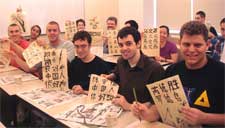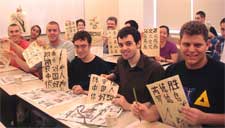 KINGSTON, R.I. –July 5, 2011—University of Rhode Island students will now be able to earn a bachelor of arts degree in Chinese, which is designed to give them the language and cultural skills to compete in the global economy.
KINGSTON, R.I. –July 5, 2011—University of Rhode Island students will now be able to earn a bachelor of arts degree in Chinese, which is designed to give them the language and cultural skills to compete in the global economy.
That’s great news for the growing number of URI students who have been filling classes to learn to speak Mandarin and discover modern Chinese culture.
The popularity of the program has skyrocketed. In the fall of 2004, thanks to student and faculty demand, URI offered its first classes in Chinese. Thirty students enrolled. By the fall of 2010, 150 students had enrolled.
URI encourages students to pursue a second major with Chinese, a combination that propels graduates of the program to even broader, international career opportunities.
URI 2011 alumna Rachael Browning of Wakefield, R.I., for example, combined chemical engineering with Chinese. As part of her program, she interned six months as a research assistant at Zhejiang University in Hangzhou, China.
When she graduated last month, she had already accepted a job offer from the international conglomerate Nestlé/Purina. Her international experience was a key factor in her hiring.
Browning will spend a year training in the United States before moving to France. While she speaks Chinese and Spanish, she is learning French.
 About 23 percent of URI students taking Chinese are enrolled in URI’s International Engineering Program. (URI educates more bilingual and cross-culturally competent engineers than any other university in the country.) The program leads students simultaneously to two degrees: a bachelor of science degree in engineering and a bachelor of arts in German, French, Spanish or Chinese. In the fourth year of the five-year program, students travel abroad; the first semester spent taking language, culture and engineering courses in the host language, and the second semester as a paid intern with a leading engineering firm. Because of the rapid expansion of global business, IEP graduates are in high demand. The program boasts close to a 100 percent job placement rate.
About 23 percent of URI students taking Chinese are enrolled in URI’s International Engineering Program. (URI educates more bilingual and cross-culturally competent engineers than any other university in the country.) The program leads students simultaneously to two degrees: a bachelor of science degree in engineering and a bachelor of arts in German, French, Spanish or Chinese. In the fourth year of the five-year program, students travel abroad; the first semester spent taking language, culture and engineering courses in the host language, and the second semester as a paid intern with a leading engineering firm. Because of the rapid expansion of global business, IEP graduates are in high demand. The program boasts close to a 100 percent job placement rate.
About 33 percent of the students taking Chinese are enrolled in the University’s International Business Program. Modeled after the International Engineering Program, the business program provides the opportunity to earn simultaneous degrees: a bachelor of science in business administration with a major in one of the seven business disciplines and a bachelor of arts in German, Spanish, French or Chinese. In the fourth or fifth year of the five-year program, students intern with participant firms in Asia, Europe or Latin America, and also are exchange students with one of URI’s partner universities.
The remaining students studying Chinese come from a variety of disciplines.
URI Chinese Summer School
Christian Thorne, a global business management student from Miller Place, N.Y. was one of 31 (26 URI) students enrolled in URI’s third annual Chinese Summer School, an eight-week intensive Chinese-language program. Students and instructors live together and speak only Mandarin for four weeks on the Kingston campus and continue their language and culture studies for four weeks at Zhejiang University in Hangzhou, China.
“It’s very intensive, but you really pick it up quickly,” reports Thorne who will enter his junior year this fall. Thorne says he sees China as a global leader. “I figure if you can’t beat ‘em, join them,” he says with a smile.
URI Chinese Language Flagship Partner Program
Alyssa Zisk, from Sharon, Mass., studied Chinese in middle school and high school. She is currently in Shanghai for the summer studying in the CIEE Accelerated Chinese Language Program. Zisk, who is triple majoring in mechanical engineering, mathematics, and Chinese, said that URI was not on her wish list until she met Erin Papa, coordinator of the University’s Chinese Language Flagship Partner Program.
URI’s Chinese Flagship Program, a federally-funded intensive undergraduate program for highly motivated students preparing for global careers, is designed to prepare greater numbers of Americans to be highly proficient in languages that are critical to national security and competitiveness. URI is one of only nine universities selected for this program nation-wide.
Zisk signed up. “It changed my life, my goals for the future and my view of the world,” she said.
Zisk is one of 20 Flagship students who will earn a bachelor’s degree in an academic discipline (such as engineering, business, political science, textile and fashion merchandising) while working to achieve superior fluency in Mandarin Chinese as defined by the American Council on the Teaching of Foreign Languages scale.
Flagship students take a two-week winter immersion program every year during their program of study. They are provided with one-on-one tutoring and their progress is closely monitored. The Flagship program’s most talented students often receive funding for a summer language program and a yearlong study/internship in China. Students are placed in a Mandarin speaking Chinese company or organization for their internships.
Many government agencies and companies come to college campuses to recruit Flagship students before they complete the program.
Chinese: Past, Present, and Future
The University’s 2007 Honors Colloquium, China Rising, and the establishment of a Confucius Institute at URI, one of only 20 Confucius Institutes in the U.S. and one of only 156 in the world at that time, boosted interest in Chinese language learning. An annual URI Moon Festival and other activities draw appreciative crowds.
A Chinese Teaching Certificate Program is in the planning stages, being developed with URI’s School of Education. Currently there are no such programs in the state.
Pictured above
Students’ names: (From right)
Eric Reels, Andrew Champagne, Christopher Kardaras, Benjamin Howard, Christian Thorne, Michael Anstirman
Photo 2 (From right)
Abel DaCorte, Jacey Jones, Christopher Chacon
Photos submitted by Wen Xiong

